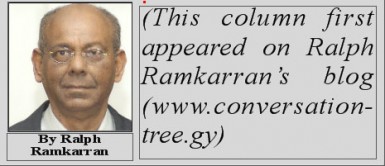The Representation of the People Act, which can be found in Volume 1 of the Laws of Guyana, contains the laws relating to elections, including the counting and recounting of votes. After the close of the poll the Presiding Officer is required to count the votes in the presence of assistant election agents and election agents. There is no provision for the recounting of votes by the Presiding Officer.
After the votes are counted by the Presiding Officers, the ballot boxes and other election material are delivered to the Returning Officer for the district. The Returning Officer ascertains the total votes cast in favour of each list of candidates in the district by adding the votes recorded on the Statements of Poll for each list and publicly declaring the votes cast for each list.
The counting agent of the political parties is entitled to be present while the Returning Officer is compiling the results and making the declaration. It would be expected that they would have the Statements of Poll of their political parties for the district and would therefore be able to follow the count and compare the final result. They would be able to point out any discrepancies between their Statements of Poll and those in the possession of the Returning Officers and, if discrepancies are discovered, to have them corrected.

After this recount a candidate or counting agent can request yet another recount. However the Returning Officer can refuse such a request if in his opinion it is unreasonable. This final recount, if allowed, will follow the procedure of the first recount. If the Returning Officer rejects this final request and denies a further recount, there is no recourse except by way of election petition. The Chairman of the Elections Commission, or the Commission itself, has no power to reverse the decision of the Returning Officer.
The Herdmanston Accord of 1998 agreed to an audit of the votes cast at the 1997 elections. Recognizing that the power to audit by way of full or partial recount or otherwise did not exist, the Electoral Audit (Caricom Agreement) Act was drafted by Sir Henry Forde of Barbados who, along with Sir Alister McIntyre and Sir Shridath Ramphal, (the three ‘wise men’) negotiated and drafted the Herdmanston Accord between the PPP and PNC after disturbances following the 1997 elections.
Section 4 of the Act provided that “an audit shall be carried out by an independent Commission…” Section 11 gave power to Chairman of the Audit Commission to give directives to the Chief Election Officer to produce any “book, document, paper or electronic
material” in his or her possession for inspection. It was on this legal basis that the votes could have been produced by the Commission to be audited. There was in fact a full recount of the votes.
Where a political party feels aggrieved, it can file an election petition to the High Court under article 163 of the Constitution. This article provides for claims based on two limbs. Firstly, the petitioner can claim that either
generally or in a particular place the elections were not lawfully conducted. Secondly, the petitioner can claim that generally or in any particular place, an election has not been lawfully conducted or the result thereof has been, or may have been, affected by any unlawful act or omission. It appears from the PPP/C’s public pronouncements on the conduct of the elections that it would have to rely on the second limb.
If an election petition is filed on the basis of the second limb, the Guyana High Court would have jurisdiction to determine the issues only on the basis of the evidence which is presented by the petitioner who has to show by that evidence which is presented that the election result was or may have been affected by the unlawful acts or omissions which are proved. It is not the function, duty or business of the court to seek out its own evidence to aid the petitioner in proving its case by ordering an opening of the ballot boxes and the counting of the votes. In any event the court has no power to do. In other words, the petitioner would not be permitted to present a scintilla of evidence showing suspicious circumstances in relation to a limited number of Statements of Poll and then call on the court to order a recounting of the votes, based on that suspicion, so that it can verify whether or not its suspicions are justified.





